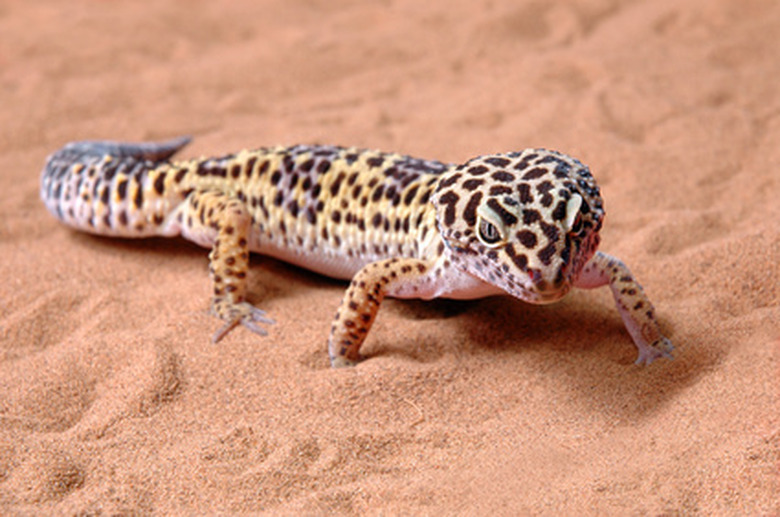Types Of Geckos In Arizona
Geckos are lizards in the family Gekkonidae. According to the EMBL reptile database, there are almost 1,200 species of geckos in the world. All geckos are small and communicate by chirping or squeaking. Most are nocturnal and excellent climbers, but some spend their lives on the ground. Geckos are divided into two groups: those with immovable (fixed) eyelids, and those with movable eyelids. Arizona is home to two species of geckos: the Mediterranean gecko (Hemidactylus turcicus) and the western banded gecko (Coleonyx variegatus). Several recognized subspecies of western banded geckos occur in Arizona.
Mediterranean Gecko
Mediterranean geckos (Hemidactylus turcicus) have large eyes with vertical pupils, but lack eyelids. Their wide, specialized toepads enable them to cling to shear surfaces, such as house windows, ceilings and outside walls, which they frequent in search of insects. Mediterranean geckos are introduced, exotic species from the Mediterranean and west Asia, but they are now scattered throughout urban areas in Arizona, including Tucson, Phoenix, Douglas, Yuma, Casa Grande, Gila Bend and Marana.
Utah Banded Gecko
The Utah banded gecko (Coleonyx variegatus utahensis) occurs in the extreme northwest corner of Arizona. It is distinguished from other subspecies of the Western banded gecko by the presence of wide dark body bands (relative to the interspaces) and highly irregular edges along the dark body bands that merge with its dark spots. Like other banded geckos (subfamily Eublepharinae), it has soft, granular scales, large eyes with movable eyelids, vertical pupils and slender toes that lack the specialized toepads seen arboreal geckos, such as the Mediterranean gecko.
Desert Banded Gecko
The gecko with the largest distribution in Arizona is the desert banded gecko (Coleonyx variegatus variegates), which occurs throughout the western half of the state. According to Stebbins' Field Guide to the Western Reptiles and Amphibians, desert banded geckos have dark body bands that are "the same width as, or narrower than, the interspaces between them." They also have spotted heads and their neck collar markings are light, indistinct or absent.
Tucson Banded Gecko
Found in a southeastern portion of Arizona, the Tucson banded gecko (Coleonyx variegatus bogerti) is similar in appearance to the desert banded gecko. The only obvious morphological difference between these two subspecies of western banded gecko occurs in males, and frankly, is not that obvious. Male Tucson banded geckos usually have eight or more preanal pores (pores located on the underside of the rear legs), whereas male desert banded geckos have seven preanal pores or less.
References
- "A Field Guide to Western Reptiles and Amphibians"; Robert C. Stebbins; 2003
- Arizona-Sonora Desert Museum: Western Banded Gecko (Coleonyx variegatus)
Cite This Article
MLA
Writer, Contributing. "Types Of Geckos In Arizona" sciencing.com, https://www.sciencing.com/types-geckos-arizona-6332337/. 22 November 2019.
APA
Writer, Contributing. (2019, November 22). Types Of Geckos In Arizona. sciencing.com. Retrieved from https://www.sciencing.com/types-geckos-arizona-6332337/
Chicago
Writer, Contributing. Types Of Geckos In Arizona last modified March 24, 2022. https://www.sciencing.com/types-geckos-arizona-6332337/
